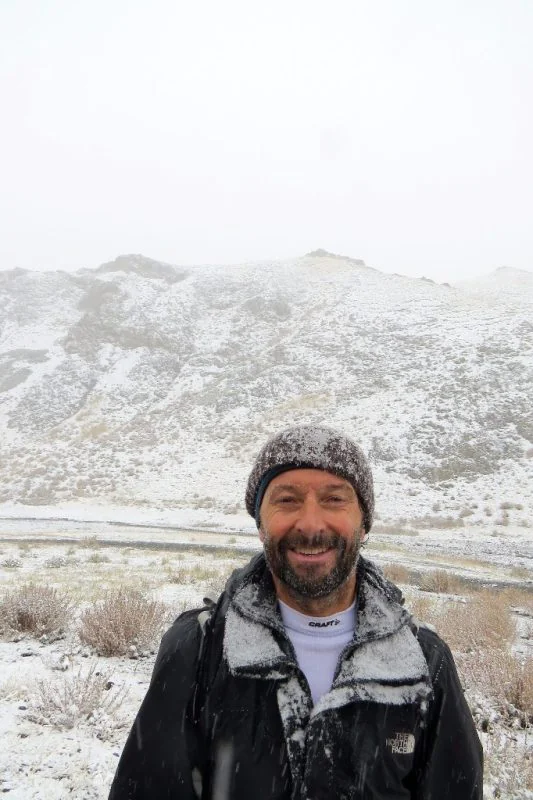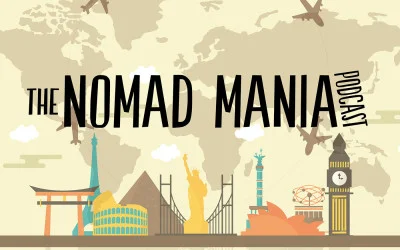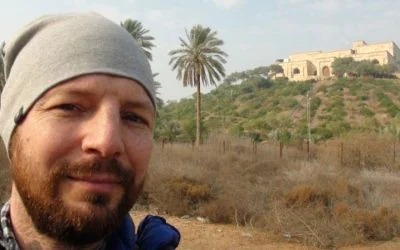Boris, tell us something about yourself and how you set out to see all the countries is the world.
Ah, what an impossible question to start with! So, I am from the Netherlands, and my travel career started when my parents put me in a travel cradle and took me on a 50-hour train trip to Greece when I was five months old. I guess that planted a seed of restlessness inside me that has been growing for the rest of my life.
At a young age, I traveled to countries inside and outside Europe, and I did 9 Inter-rail trips through Europe as a teenager and in my early twenties. Office job turned out to be too static for me, so I quit, travelled more, and worked as a freelancer in several African countries. Then, when I finally went to university, I was so bored I applied for a job as a flight attendant. After I got my university degree (Political Science/International Relations) I decided to stay and make a career in aviation instead of pursuing another job, which probably would have involved office life again.
My job (Senior Purser on intercontinental flights) ensures me constant travel, and if anything, has much increased my desire to discover more of this beautiful planet. It also allows me time to travel in between flights. For a long time, I visited several countries a year I hadn’t been to before. In 2008, I reached a point where I had to redefine my purpose of life, and I decided to set the ultimate goal: visit all UN-recognized countries in the world before 2020. Back then, I had been to some 120 countries, and it seemed like a daunting task. Now, I am almost done: 4 to go! Even though my job gives me the advantage to visit many countries on work trips, I have visited almost all countries privately as well, which means I have been more than once to most of them.
What kind of a traveller do you consider yourself to be?
I believe that one of the most important assets of a traveller is to be flexible. To me, this means that there is not one single way of travelling: you need to adjust to the circumstances that you meet on the ground. That is why I don’t think there is one answer to your question.
Some of my best trips were overland trips, where I travelled from A to B. Not only does it give you a real goal to travel to, it also means that you can always look at a map later on, and see the distance you have covered. As for modes of transportation: I love something in all different modes of transportation. I have done crazy trips in Africa on the back of a motorbike without any protection, which afterwards became great memories. I love to travel by train and boat. And yes, flying is great, especially when you can be next to a window and watch the sky, ocean and land below you. But in most cases, the changes of culture, climate, time zone etc. that air travel brings, are too abrupt.
Solo travel is the ultimate freedom: you can choose the pace of your travels, you can pick your company, you decide when to go where. I have done most of my travels alone, and some of those journeys will stay in my memory forever. Apart from that, it is probably the best possiblity in life to learn more about yourself and to grow self confidence.
Traveling with the right travel companion also brings advantages: it can open your eyes to things you might have missed, you can discuss a situation and decide (and hopefully, agree!) what to do, you can support each other, laugh together, look after each other. After the trip, if you stay in touch, you can recall fond memories of your adventures. Also: I am convinced that the best way to see if a new partner in life suits you, is to travel with her/him – it is the best way to know someone (and get to know yourself better, too).
I absolutely dislike traveling in groups, and have managed to minimize that so far. I am actually about to travel to Chad on an organized journey, and am a little anxious about the conditions and the fellow travellers whom I don’t know. But it is hardly possible to travel the country independently.
As for the length of trips: because of my job, I am used to make the most of a short stay, and to travel intensively. Short (city) trips of a couple of days can be great, but I prefer to have more time in a country. By far most of the countries I have visited, I spent a couple of weeks (bar small countries like San Marino, Nauru). I have been fortunate to be able to do several trips longer than a month, and it gives the great feeling of being completely detached from home. At the same time, I believe that it is good to be back to “normal” life every now and then, to recharge your travel batteries.
What are some sacrifices that you feel you have made in order to spend so much time on the road?
The obvious one is to see much less of my family and friends back home. I have no kids (that would be impossible with my life style), but I have two nieces, and it has happened that I see them again after a few months of absence, to realize that they have grown almost beyond recognition – and I have missed part of their development.
I am very much into sports (mostly running, cycling, speed skating, circuit training), and these last years, I have considered entering competition again. When I am home, I train every day. But since I want to do whatever I do to the max, traveling has prevented me from doing it: I simply don’t have time enough to properly prepare for a competition.
Sometimes, when I come back from a long work flight, I leave the same or next day, which means I unpack, pack, and leave, and there have been cases I wondered what I was doing, and why I could not just take a break and stay home for a few days. I remember coming back from a work flight to Ecuador, and just two days after leaving tropical Guayaquil, I found myself walking in the former torture chambers of Saddam Husseyn in northern Iraq. Coming back from Japan, and being in a jam-packed bus the next day in Cameroon on my way to Central African Republic. And many more cases like that – every time, it felt … weird.
At the same time, travelling gives me so much energy and makes me so profoundly happy, that all these feelings are worth it.
Share some of your most memorable travel moments with us, good, bad and ugly!
Haha, what a question again – I mean: where to start? And, how much space do I have? OK, here we go.
Ugly. One of the nastiest moments in my travel life was entering Equatorial Guinea. Getting the visa had already been very difficult and weird, involving a meeting with a high-heeled employee of the embassy in her blinded, black car outside a shopping mall, paying a ridiculous amount of money, but with her guarantee that I could visit any place in Equatorial Guinea without a problem. Upon arrival at the border, the officials refused to stamp my passport, unless I paid them of course. If not, they threatened to put me in jail. When I called the lady of the embassy who had promised me I could always call her in case of problems, she shouted at me and cut the connection. At the border, there was a woman who was playing with a gun, who appeared crazy enough to actually shoot.
Their sense of power over me, the fact that some of them were drunk – it all gave me a feeling of lawlessness and powerlessness that I had not experienced before. Miraculously, three Spanish nuns appeared after a couple of hours; fortunately, I speak Spanish fluently, and they helped me out and took care of me. Bottom line: no matter how impossible a situation seems, in the end, there is always a solution.
Bad. Travelling in Cuba, we felt that most people were out to make money on us, often in an unfair way. Inviting us home, chatting, giving us a coconut to drink – only to ask us money for it when we left. Two guys stole a precious pendant from the ex-girlfriend with whom I was traveling. A taxi driver cheated on us in a ridiculous way, and when I paid him what we had agreed on beforehand, he chased us with the police. In the discussion that followed, all our frustration came out in my remark that “all Cubans are thieves”. The policemen took me to their station, where they told me that I had just insulted Fidel Castro with my remark. The accusation therefore was “insulting our head of state”, and I instantly knew I was in serious trouble, especially when they confiscated my passport. It was a Sunday, embassies were closed, and it took me an eloquent discourse about the beauty of the country and the unfortunate things that happened to us with dishonest people, and noting that I of course never intended to insult Mr. Castro, to have my passport back and get out of that thorny situation.
Good. Ah – so many good travel experiences, it’s hard to decide where to start! Before going, many people had warned us: Sudan is a dangerous place! Soon enough, however, my girlfriend and I fell in love with the country, and especially its people. They would walk over in the street, stand in front of us, put their hand on their heart, and proclaim “Welcome to Sudan!”. Never did they try to take advantage of us, cheat us, or abuse us – on the contrary. On one shared minivan ride, there was a handicapped son with his very old mother. She could hardly see anymore, and her skin looked like wrinkled old parchment. They had a bag which was in rags, in which we imagined were their belongings. We felt touched by them, and were thinking what to give to them; unfortunately, we didn’t have a spare bag to give away. At every stop, we helped the old lady and her son to get on and off the minivan. Then, suddenly, they got off, and made a sign they had already paid our bus fare. They – who clearly were very poor people, and to whom we could not talk because we didn’t speak their language, and they didn’t speak ours. We had tears in our eyes when we drove off, with the old woman and her son waving us goodbye. Just one example of Sudanese hospitality we experienced on our journey through this very interesting country.
For hundreds more (mostly “Good”) stories, with pictures: continue reading on my website www.traveladventures.org.
Tell us more then about your blog, traveladventures.org. How did the site come about and what audience is it mainly geared to?
As a child, my parents sometimes wanted to come back home from a trip after the start of the school year. In The Netherlands, this is quite difficult: you are not supposed to miss one day at school. The headmaster agreed on the condition that my sister and I write diaries about our travels, so we could at least practice our writing skills. It resulted in a collection of diaries that are much fun to read now.
Then, when the Internet came about, I quite soon realized it was a great way to share my travel stories with a wider audience. In 1999, I bought the domain name traveladventures.org, and started to scan old pictures, and write stories to accompany them. It gradually grew into the site it is now. I can safely say that it is the biggest project of my life: I not only take all the pictures and do all the writing, but also developed the site technically, using the knowledge I have as an IT person (at last, the experience of my office job still pays off!).
The audience is mainly fellow travellers who are looking for ideas for their next trip. I am regularly contacted by people who want to travel somewhere, and have practical questions about their desired destination, and I try to help them as good as I can. Moreover, I want to provide people who for whatever reason are not in a position to travel, the opportunity to see places around the world without leaving home. I frequently get feedback from people who thank me for showing me all corners of the world which they could never visit.
Can you explain the ’80 Clicks’ section of your website to us?
When I started the website, I also wanted to have a title for the site. Then, Jules Verne came to mind with his famous novel Around the World in 80 Days, and I converted it to Around the World in 80 Clicks. When I modernized my website back in 2013, I decided to have a separate 80 Clicks section, also because some people didn’t get the link to Jules Verne. So I thought it would be nice to have a surprise trip around the world: start at a random place, and then travel always towards the east so you could literally travel around the world in 80 clicks using your mouse.
Travel photography is a big part of your life and you yourself are a photographer. How does this influence your perception of a place?
It has such a big impact, I mean, it is hardly possible for me to walk around a place without thinking about how and when I would take pictures, even when for some strange reason I don’t have a camera on me. Of course, I travel for the experience of traveling, and of enjoying a place, but photography then is a deciding factor in many ways. It is, again, very much part of my desire to share whatever beautiful things I see with the outside world. Before visiting, and during my visit, I always try to find the best moment of the day, to get the best shots. The first thing I do after I arrive, is to establish sunrise and sunset hours, and plan around those times.
Your very first trip as a baby was to Greece and you have decided to make your last country Ireland next year. To what extent do you think the European continent is capable of producing ‘travel adventures’ for big travellers who often prefer more distant destinations?
Oh, I think it is a mistake to rule Europe out for travel adventures. For my job, I had been flying only outside Europe, and loved it. It was when I made a career and did seven years of almost solely European flights, that I realized what a beautiful continent we have, with such variation in climate, language, history, culture, cuisine…
I think the secret about Europe is timing. You visit Venice, Paris, Athens, or most of the many other destinations in summer and you will probably be disappointed. Come back in spring or autumn, and it will already feel much better. Secret: come as early as possible! I have been wandering about Venice at 5.30am in summer and had the city to myself, until the crowds started to flow in.
Apart from the rich historic and cultural heritage you can see in Europe, there also still is a lot in the way of adventure in nature. Or take Belarus or Ukraine, not much visited, but traveling around there can certainly feel like an adventure, if only because you might have language barriers to deal with. Even in my own country, there are places that most don’t consider, like some of the islands in the north or southwest, or the provinces outside the “Randstad” where the major cities are located.
What are a few Dutch gems that travellers to the Netherlands should know but don’t?
Haha, there are a few peculiar things we eat in my country that I don’t think many foreigners will call gems. One of the things that have become a tradition in my travelling, is to take a bag of liquorice with me when I leave. Other specialities that I love are stroopwafels (you can now even get them abroad, like the USA) or hagelslag which I am convinced is only good on white bread. In autumn, and before December 5, we have a lot of sweets that I think are gorgeous, like “gevulde speculaas” (stuffed speculaas), chocolate letters, pepernoten. One of the things I show foreigners when they come to the Netherlands, are the walls with machines from which to buy snacks like frikandel or kroket (by the way, I don’t like either!).
A unique thing to see (and experience) in The Netherlands is when the lakes and canals freeze over, people get their skates out, and ride around the country in massive numbers. Unfortunately, winters are milder than before, which means that whenever it happens, it stirs a craziness among most of us. The ultimate event is the Elfstedentocht in Friesland, which is a skating tour of 200km. It only happened 15 times in the last 100 years; the last time being 1997. When it happens, it turns the country upside down, and life comes to a standstill.
So in 2017 you plan to ‘finish’ the UN countries. What happens after that?
A few years ago, when I was deleting countries from my still-to-visit list, I started a new list of places I wanted to re-visit. Sometimes, I loved a country so much that I deleted it from one list, and immediately added it to the other (Papua New Guinea, Iceland, Bahamas – just to name a few). After visiting some quite “difficult” and/or dangerous countries these last years, I very much look forward to visiting countries where I don’t need a visa, where there is no time difference or long flights involved, where I speak the language, and where the food is great. My first country after Ireland will be Italy; even though I have been there very often, there are still many areas I haven’t visited yet. I just can’t wait to explore more of it, to eat the delicious Italian cuisine, to brush up my Italian, and to fly home in under two hours or hey, maybe even take the train!
Then, I also want to re-visit the countries that I have been to, but which for various reasons do not appear on my website yet – like Cyprus, Afghanistan, Ivory Coast, and a few more. On top of that, there are places like Greenland and Faroer Islands, a road trip through the USA, seeing more of countries like Bolivia, PNG, Nepal, Russia, and oh, so many more.
And finally, a question we like to ask many people – if you could invite four people from any period of human history to an imaginary dinner, who would they be and why?
I had to think hard about this one (only four?). Here we go.
Mark and Marilyn. They are two friends from Toronto, Canada, I met in Chile in the early 1990s, who tragically died in a kayaking accident in 1998. I quite often think of them when I travel, and still miss them a lot. I would love to talk to them again, about traveling, like we did before: the countries we visited, and my current project of visiting all countries.
Marco Polo. I would love to show him the world we live in now, and for instance, take him on a flight to China, show him how it has become one of the big powers of our world. At the same time, I would love to listen to him talk about his travels and experiences – and to see if I could understand his Italian.
Odysseus. As a child, I read and re-read the Odyssea, which I consider the first travel book I ever read. Adventures, good, bad and ugly (just like you asked me before!), luck, loss, and perseverance: it is all there. I would love to hear his stories about ancient Greece, the siege of Troy, and of course: his long journey back to Ithaca.
Leonardo da Vinci. Apart from admiring him as an artist, he also designed the first planes, and I would love to take him on a flight (of course leaving from Leonardo da Vinci airport!) to show him how his dreams became reality, and changed the world.
Apart from listening and talking to these persons, I would love to hear them talk to each other about their respective times in history, their lives, their realities, and their visions.
The photos in this article are from Boris’ personal collection They show him in Mongolia, Ethiopia, Mozambique, Antarctica, Djibouti, Bhutan, Somalia, South Georgia and Argentina.











